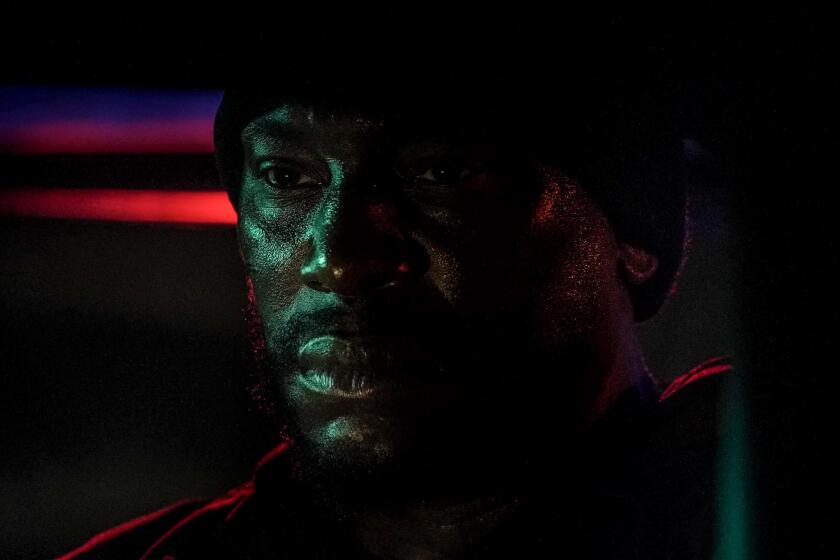Review: ‘I Do Not Care If We Go Down in History as Barbarians’ interrogates the past
The title of “I Do Not Care If We Go Down in History as Barbarians,” Radu Jude’s explosively eloquent and morally galvanizing sixth feature, is a quotation from the words of Ion Antonescu, the 1940s Romanian marshal who steered his country into an alliance with Nazi Germany. The horrors of Antonescu’s anti-Semitic regime, which led to the killings of an estimated 380,000 Romanian Jews, are among the subjects that Mariana Marin (a superb Ioana Iacob), a present-day theater director, plans to confront in an upcoming government-funded historical pageant.
She is mounting a stylized reenactment of the 1941 Odessa massacre, when Romanian and German troops occupied that city and slaughtered tens of thousands of Jews. In depicting these atrocities, Mariana hopes to restore them to the attention of a public that has conveniently forgotten them — or worse, regards them with indifference. She wants to provoke her audience, to tear aside the protective veil of nationalist pride and lazy thinking, and compel them toward a rare posture of reflection and accountability.
The likelihood that Mariana will succeed in her aims is roughly equivalent to the likelihood that “I Do Not Care If We Go Down in History as Barbarians” will inspire the late-summer box-office stampede it deserves, a fact of which Jude seems cheerfully aware. The difficulty of turning mass spectacle into moral edification, of getting the public to think and care about history in ways that go beyond simple-minded patriotism, is a problem that this brilliantly multifaceted picture both critiques and embodies.
And so it is no surprise that, even before the pageant has taken place, Mariana encounters resistance. The extent of Romania’s involvement in the Holocaust is not a topic that sits easily with those who were expecting a straightforward, unambiguous celebration of their nation’s military might. Some of the civilian extras, many of whom have signed up for the pleasure of brandishing rifles and marching around in army regalia, clash with Mariana’s vision and reveal their own prejudices in the process.
But her thorniest, most infuriating and inescapably fascinating sparring matches are with a city official, Constantin Movila (Alexandru Dabija), a skilled bloviator who posits, with breathtaking cynicism, a Darwinian hierarchy of war crimes. “Only the fittest massacres survive in the collective consciousness,” he says, trying to cajole Mariana into choosing a safer, more historically remote subject. When cajoling doesn’t work, he petulantly threatens to cancel the whole event.
A passing knowledge of some of the subjects under discussion — the writings of Hannah Arendt, Raul Hilberg, Jean Ancel and Ludwig Wittgenstein would be a good place to start — will clearly only help the viewer who takes on this intellectually dense but extraordinarily fluid movie. But a lack of expertise is no barrier to appreciating the depth, range, passion and accessibility of this movie’s scholarship, or the formal playfulness and dark comedy with which Jude presents it.
In an early scene that cheekily demolishes the fourth wall (and then quickly rebuilds it), Iacob turns to the camera, identifies herself as an actor and notes that her character, Mariana Marin, is not the renowned Romanian poet of the same name. This quasi-Brechtian rupture is soon forgotten; and the initially shaky camera, visibly operated by a member of Jude’s crew, soon steadies itself. Within minutes we find ourselves immersed with Mariana in her research and preparations, in the daunting logistical and intellectual complexities posed by this particular production.
But it is hard to forget that reference to the late Marin, one of many dissident artists who were censored in the 1980s for criticizing the communist dictatorship of Nicolae Ceausescu. In one of her volumes, Marin even invented a character inspired by Anne Frank, drawing an implicit historical parallel that brings together some of the relevant themes at play in the movie. As some of the characters note, the 1989 revolution that deposed Ceausescu encouraged a rose-tinted reappraisal of the anti-communist Antonescu’s legacy and a willingness to look past his most unspeakable war crimes.
Jude, a gifted practitioner of the new Romanian cinema that has flourished for more than a decade, here sets aside the lustrous black-and-white cinematography and 19th century mise-en-scène of his 2016 breakthrough picture, “Aferim!” In that movie, he confronted another form of bigotry, using the conventions of the classic western to illuminate his nation’s long history of anti-Roma violence, then and now. His target and techniques in “Barbarians” may be different — the images are plain and unvarnished, and the stuff of lived history is relegated to old photographs and archival footage — but his desire to shake the audience out of its moral complacency remains.
He shares that desire, of course, with Mariana, whose intellectual vivacity cannot be reduced to high-minded posturing, even if her adversaries try to diminish it as such. Her idealism goes hand in hand with a tough-minded practicality. Her preparations for the big event — the marshaling of tanks and weapons, an outdoor band rehearsal that coincides with a sudden rainstorm — provide brief bursts of let’s-put-on-a-show comedy. Meanwhile, her ongoing affair with a married pilot (Serban Pavlu) carries a domestic echo of the boorishness and denial of responsibility she will encounter in the course of her work.
At 140 minutes, “I Do Not Care If We Go Down in History as Barbarians” is long and talky in the best sense, a movie predicated on the power of a well-made argument. The intelligence and sustained intensity of the dialogue scenes, most of them shot in lengthy, unbroken takes (by the cinematographer Marius Panduru), induce a mood of heightened concentration. The movie’s refusal to dumb down its ideas, truncate its arguments or skimp on the power of its own verbiage is precisely what makes it so mesmerizing.
The climactic reenactment of the Odessa massacre may not have its desired impact on the audiences we see gathered on screen but it is nonetheless powerful and sobering for us to witness, in part because the lessons it leaves us with are not limited to Romania alone. The genius of “I Do Not Care If We Go Down in History as Barbarians” is that, without sacrificing an iota of its piercing specificity, it speaks to the forces of nativism and barbarism that are dispiritingly common to every country and culture. We really should know better by now. In watching this movie, perhaps we do.
‘I Do Not Care If We Go Down in History as Barbarians'
In Romanian with English subtitles
Not rated
Running time: 2 hours, 20 minutes
Playing: Starts July 26, Laemmle Monica Film Center, Santa Monica
More to Read
Only good movies
Get the Indie Focus newsletter, Mark Olsen's weekly guide to the world of cinema.
You may occasionally receive promotional content from the Los Angeles Times.











